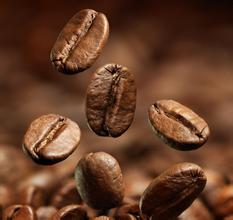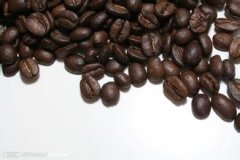Description of Flavor of High-quality Coffee beans in Tanzania introduction to manors in producing areas
The coffee beans are of extraordinary quality and are produced in the Mohi district near Mount Kilimanjaro. The mountain area with a height of 3,000 to 6,000 feet is the most suitable area for growing coffee. Fertile volcanic ash gives the coffee here a strong texture and soft acidity. It exudes delicate aromas and contains aromas of wine and fruit, making people taste endless aftertaste. After drinking Kilimanjaro coffee, I always feel a soft and mellow earthy smell around my mouth. Coffee gourmets often use words such as "wild" or "wild" to describe it. It can be said that pure Kilimanjaro coffee is "the most African coffee". Kilimanjaro AA is the highest grade of beans, its grains are full, pure flavor, rich and refreshing, all aspects of quality are good. It is usually more acidic than Kenya coffee and evenly stimulates the taste buds in the middle and sides of the back of the tongue, feeling a bit like the sour taste of tomato or soda. After moderate or more moderate baking, it has a strong aroma, then grind it into a fine powder, soak it in a pot of boiling water, and invite friends to sit around and taste it. The famous coffee brands in Tanzania are Africafe, Tanica Cafe, Kilimanjaro and so on, and their quality is much better than the Nestle coffee we often drink. Tanzanian coffee has long been loved by Europeans and has joined the ranks of famous products. Europeans give Tanzanian coffee the nickname "coffee gentleman", and coffee connoisseurs call it the "coffee swordsman" with the mocha of "King of Coffee" and "Lady of Coffee".
Mount Mount Kilimanjaro, located in northeastern Tanzania, is the highest mountain in Africa at 5895 meters above sea level. The ultra-high altitude makes the top of the mountain snow all the year round, while Tanzania's main coffee producing area is located at the foot of Mount Kilimanjaro. The area is rich in volcanic soil, which brings an adequate supply of nutrients for the growth of coffee trees. Coffee trees are generally planted at high elevations above 1150 meters, which is one of the prerequisites for Arabica to develop a high-quality flavor.
Tanzanian coffee is mostly washed. After picking, coffee farmers will send the coffee fruit to the nearest processing plant for processing. The treatment step of the water washing method is to screen and remove the impurities in the coffee fruit, then remove the coffee pulp and exocarp, and send it into the fermentation tank to remove the pectin layer on the inner pericarp by fermentation. clean and then dry. Coffee in Tanzania is graded in the same way as in Kenya, both according to the size of coffee beans. When screening raw coffee beans through a sieve with fixed size holes, the larger the number of the sieve is, the larger the particles of raw coffee beans are. The flat beans classified by size are mainly AA+, AA, AB. In addition, PB (peaBerry), which is more produced in Kenya and Tanzania, also has a set of sieve size standards dedicated to grading the size of round beans.
Tanzania is also often compared with its nearest neighbor Kenya. It is said that the earliest Arabica coffee in Tanzania was introduced by Christians from Kenya and is similar to Kenya in flavor characteristics. With grapefruit aromas and soft and bright acidity. However, because the economic conditions of Tanzania are worse than those of Kenya, the production conditions are poor. Tanzania's quality control is not strict enough, destroying the quality of coffee in many processing links, which can not compete with Kenya, which is famous for its high quality. Although it is similar to the Kenyan flavor, Tanzania as a whole is smoother and softer and belongs to the balanced type. With moderately low acidity and sweetness, dark chocolate finish, moderate mellow thickness. Compared with Kenya, which has a prominent personality, Tanzania is less hierarchical and does not give a very prominent feature after drinking, which makes people less impressive. But on the contrary, its soft and round characteristics are also more agreeable, which is easy to be accepted by people who are new to coffee.

Important Notice :
前街咖啡 FrontStreet Coffee has moved to new addredd:
FrontStreet Coffee Address: 315,Donghua East Road,GuangZhou
Tel:020 38364473
- Prev

Introduction to the flavor and taste of the fragrant Jamaican Blue Mountain Coffee Variety
From the above, we can get a general picture of the production of Blue Mountain Coffee. It should be noted that 99.9% of the blue mountains that can be drunk in China are only grown near the Blue Mountains. Only coffee produced on 6000 hectares above 1600 meters above sea level can be called Blue Mountain, and the yield is always less than 900t. According to the principle of 10% supply to the world outside Japan, this kind of coffee can be called Blue Mountain.
- Next

Introduction to the flavor and taste characteristics of high-quality coffee beans in Indonesian civet coffee producing areas
Kopi Luwak is produced by the feces of Indonesian coconut cats (a kind of civet) as raw materials, so it is called Kopi Luwak. This kind of animal mainly feeds on coffee beans. After completing fermentation in the coconut cat's stomach, it destroys proteins, produces short peptides and more free amino acids, reduces the bitterness of coffee, and then excretes feces as the main raw material. Because coffee beans cannot be digested, they will be
Related
- Detailed explanation of Jadeite planting Land in Panamanian Jadeite Manor introduction to the grading system of Jadeite competitive bidding, Red bid, Green bid and Rose Summer
- Story of Coffee planting in Brenka region of Costa Rica Stonehenge Manor anaerobic heavy honey treatment of flavor mouth
- What's on the barrel of Blue Mountain Coffee beans?
- Can American coffee also pull flowers? How to use hot American style to pull out a good-looking pattern?
- Can you make a cold extract with coffee beans? What is the right proportion for cold-extracted coffee formula?
- Indonesian PWN Gold Mandrine Coffee Origin Features Flavor How to Chong? Mandolin coffee is American.
- A brief introduction to the flavor characteristics of Brazilian yellow bourbon coffee beans
- What is the effect of different water quality on the flavor of cold-extracted coffee? What kind of water is best for brewing coffee?
- Why do you think of Rose Summer whenever you mention Panamanian coffee?
- Introduction to the characteristics of authentic blue mountain coffee bean producing areas? What is the CIB Coffee Authority in Jamaica?

